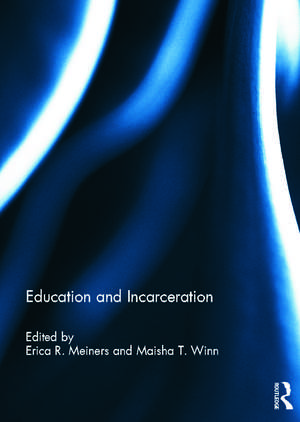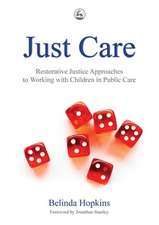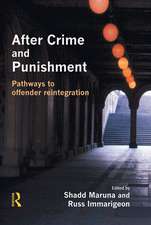Education and Incarceration
Editat de Erica R. Meiners, Maisha T. Winnen Limba Engleză Hardback – 20 dec 2011
Education and Incarceration highlights the significance of centering agency and autonomy, and documents scholars who work to be accountable to justice movements and communities, not simply to academic disciplines or to research. Additionally, as emerging scholars committed to challenging the PIC, these authors struggle to build multi-layered analytic and material tools for resistance within and beyond the walls of schools, jails and prisons. This book provides snapshots of practices in motion: activist scholars working to engage, to be accountable to families, communities and larger justice movements, and to build abolition democracies.
This book was originally published as a special issue of Race Ethnicity and Education.
Preț: 763.97 lei
Preț vechi: 1064.98 lei
-28% Nou
Puncte Express: 1146
Preț estimativ în valută:
146.21€ • 152.08$ • 120.70£
146.21€ • 152.08$ • 120.70£
Carte tipărită la comandă
Livrare economică 14-28 aprilie
Preluare comenzi: 021 569.72.76
Specificații
ISBN-13: 9780415693455
ISBN-10: 0415693454
Pagini: 146
Dimensiuni: 174 x 246 x 15 mm
Greutate: 0.44 kg
Ediția:1
Editura: Taylor & Francis
Colecția Routledge
Locul publicării:Oxford, United Kingdom
ISBN-10: 0415693454
Pagini: 146
Dimensiuni: 174 x 246 x 15 mm
Greutate: 0.44 kg
Ediția:1
Editura: Taylor & Francis
Colecția Routledge
Locul publicării:Oxford, United Kingdom
Public țintă
Adult education, Postgraduate, and ProfessionalCuprins
Chapter 1. Resisting the school to prison pipeline: the practice to build abolition democracies Erica R. Meiners and Maisha T. Winn Chapter 2. Home/work: engaging the methodological dilemmas and possibilities of intimate inquiry Crystal T. Laura Chapter 3. Our lyrics will not be on lockdown: an arts collective’s response to an incarceration nation Keisha L. Green Chapter 4. ‘Our side of the story’: moving incarcerated youth voices from margins to center Maisha T. Winn Chapter 5. Contesting institutional discourse to create new possibilities for understanding lived experience: life-stories of young women in detention, rehabilitation, and education Suniti Sharma Chapter 6. Enclosures abound: Black cultural autonomy, prison regime and public education Damien Schnyder Chapter 7. Criminality of Black youth in inner-city schools: ‘moral panic’, moral imagination, and moral formation Sarah Farmer Chapter 8. It’s not just a method! The epistemic and political work of young people’s lifeworlds at the school–prison nexus Patricia Krueger-Henney
Descriere
The USA is in possession of the largest prison population in the world, with 2.3 million people currently behind bars - predominantly and disproportionately made up of communities of colour and poverty. Education and Incarceration highlights the significance of centering agency and autonomy, and documents scholars who work to be accountable to justice movements and communities, not simply to academic disciplines or to research. As emerging scholars committed to challenging the prison industrial complex, these authors build multi-layered analytic and material tools for resistance within and beyond the walls of schools, jails and prisons. This book provides snapshots of practices in motion: activist scholars working to engage, to be accountable to families, communities and larger justice movements, and to build abolition democracies. This book was originally published as a special issue of Race Ethnicity and Education.









